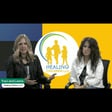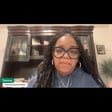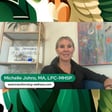Season 3 Introduction
00:00:00
Speaker
Welcome to season three of the Guardians of Hope podcast. We are a community of parents, educators, health, legal, and tech experts dedicated to positively impacting children's lives. The thoughts and opinions of my guests are not my own. This is a platform for sharing. hey Welcome everyone.
Child Sexual Abuse Statistics
00:00:19
Speaker
in today's digital age, parents face a shocking reality that most don't see coming. Over 70% of child sexual abuse cases involve another child or a teen as the perpetrator.
00:00:33
Speaker
Add artificial intelligence and smartphones into the mix, and we're dealing with an entirely new landscape of harm that's escalating rapidly.
AI and Peer-Generated Images
00:00:42
Speaker
According to recent research from Thorne,
00:00:45
Speaker
One in four teens have either seen or know someone who's been targeted by AI-generated nude images. And these incidents doubled in 2024 alone.
00:00:56
Speaker
What's particularly devastating is that the majority of these deep fake nudes are being created by classmates or ex-partners.
Introducing Jenny Coleman
00:01:05
Speaker
Today, we're joined by Jenny Coleman, director of Stop It Now, a national leader in child sexual abuse prevention.
00:01:13
Speaker
Jenny, thank you so much for joining me today. Oh, thank you so much for having me. Of course. So why don't we dive in and please tell us about your background and your work to start.
00:01:25
Speaker
i Sure. ah ah my name is Jenny Coleman. I'm the director of Stop It Now, which is a national child sex abuse program. I've been the director for about 10 years, having been here for about 13, 14 years, where I began as the director of our helpline.
00:01:43
Speaker
I'm a licensed clinician here in the state of Massachusetts. And um for the first 20, 30 years of my career, i had been working on behalf youth's well-being, ah children and teenagers who were in the so-called system, in foster care, in residential programs, and also practicing therapy with both the children and with their families.
00:02:07
Speaker
um And I've just been committed for many years in children and families' well-being in a variety of ways, making sure that they have the help and support that they need and also the resources that they need to have healthy relationships and and hopefully thrive.
Rethinking 'Stranger Danger'
00:02:23
Speaker
Yeah, Jenny, thank you so much for sharing that with me. And um I'm really looking forward to diving into this topic with you. ah That statistic that I talked about that over 70% of reported child sexual abuse cases involve another child or teen is staggering and probably surprises many parents.
00:02:47
Speaker
How do we help parents understand peer-to-peer abuse is often um the greater threat than the stranger danger that we all grew up with?
Addressing Children's Sexual Behavior
00:02:58
Speaker
Yeah, absolutely. And what a great question, because it is so shocking to parents.
00:03:02
Speaker
It's been a lot easier to actually think about the risk that's out there, the monster, if you will, that lives outside of our family. But we've known for a number of years that in actuality, it's not stranger danger that kids or families do know the person who has abused them.
00:03:24
Speaker
but up to 90% of the time. So that stranger danger is an old fallacy that gets in our way of prevention. Further, many of us who have worked with kids for so many years know that kids and sexual behavior problems, unfortunately, are way more common than we were talking about.
00:03:42
Speaker
We have the tendency to excuse children's sexual behavior problems or even just sexual exploration that may be normal and developmentally appropriate, but still can be concerning without um a lot of support and education and and parents engagement.
00:04:00
Speaker
So I think the notion that if we talk about children's sexual behavior problems with each other means that, oh, no, we're talking about, you know, kids who could be sexual sexually abusing someone or, you know, who could end up in jail.
00:04:15
Speaker
But we need to talk about them early and the sexual behaviors that just at a very low bar begin to feel unsafe, begin to feel uncomfortable and set up dynamics between kids.
00:04:30
Speaker
that begin to kind of grow into bigger problems when we're not comfortable talking about it and making sure that kids have the information that they need about their bodies, about sexual development, about relationships. um And so part of it's just getting over those barriers and, and seeing that we can keep keep kids safe from sexual harm.
00:04:53
Speaker
We just have to have those conversations earlier and earlier with ourselves as parents and caregivers, but also with our children. um And, you know, we're going to talk about this, but, you know, kids are practicing relationships in all sorts of ways, not just in their in real time lives, but online.
00:05:15
Speaker
And when we think about, you know stranger danger, in fact, this is Kids are engaging with kids and youth all over.
Digital Consent Conversations
00:05:25
Speaker
And we when we say, you don't know who's out there, we don't you know you're talking to strangers. For these kids, these are friends of theirs.
00:05:34
Speaker
So we just need to reshape some of how we've been thinking about how to talk to kids about safety ah because the world has opened up their world. And so we need to be more responsive to that.
00:05:48
Speaker
Yes, it's very delicate, but you're so right about starting these conversations earlier and earlier because they're becoming more exposed at an earlier age um So with that, with AI-generated nude images doubling in 2024 and most being created by classmates or ex-partners, how should parents approach conversation? So we talked about you know you know um just approaching the the barriers or lifting those barriers up and approaching it from a younger age, but how do they even...
00:06:23
Speaker
How do parents talk about it? How do we have these conversations about digital consent and boundaries with their teens? Right. Well, we don't have to wait to talk about it just in regard to online behavior. So we're already talking to kids about how to treat each other, what to do when you're scared, what the rules are, and and even what happens when the rules are broken. So we can translate that to this other part of their world.
00:06:52
Speaker
um And you know I wanna emphasize, because I think we often think, how do I protect my child from being harmed? Of course, that's our priority.
00:07:03
Speaker
And we also have to be having conversations with kids about being good digital citizens themselves. So as we're talking with kids about things like being kind, bullying behavior, developing empathy, compassion, respecting privacy, consent,
00:07:21
Speaker
you know all of those topics that are so important for for us to have with kids, again, we're transitioning that to their own behaviors towards others and in the online world.
00:07:34
Speaker
So for example, if kids, and they're usually the first to know that another kid is passing around images or content that in some way violates another youth's privacy,
00:07:47
Speaker
is harassing to them, we can talk to them about what to do when you know that's happening. you know Who would you tell? yeah How would you know there's a problem? And that's another thing we can do is really talk with kids about what are the warning signs for you when you feel that something's feeling kind of ah you know wonky, unsafe, questionable, suspicious.
00:08:10
Speaker
yeah What are the kind of words that others may use or what's the sense in your body that's like, oh, I'm getting nervous. I have butterflies that can help you know when to ask for help, walk away from the screen, talk to someone about what's going on.
00:08:25
Speaker
Mm hmm. That's great advice. And I, you know, I talked to my son about this all the time. He's 12 and you want to, as a parent, make sure that they, you allow them that independence to, you know, learn from things and experiences, but you also have to set those guidelines with them. So it's so important.
00:08:47
Speaker
and that i Thank you so much. That is exactly what we need to do. it It is sometimes it feels like a a fine line. And in addition, we're modeling for our kids our own behavior online. How do we walk away? How do we know when there's a problem?
00:09:03
Speaker
What content, what information do I share online? So we can wrap that into a whole family conversation about in this family to stay safe.
00:09:14
Speaker
Here are some things that I do as an adult and here are some things that kids have to do. And here are things we all have to do. We don't share each other's private information. For example, we don't share photos of ourselves
Supporting Young Perpetrators
00:09:27
Speaker
That doesn't answer you know the deep fake i a But it begins to help kids be able to trust their gut, know when to ask for help, um and but give them choices about behaviors. Like, oh, i don't, there are ways to go about this that doesn't mean I just get pulled in and don't know how to dig myself out.
00:09:48
Speaker
Yeah, exactly. and And knowing when and how to ask for help is so important, Jenny. Yeah, true. um So talking about that, when a child becomes a victim of deep fake nudes or other peer perpetrated sexual abuse, parents often struggle with conflicting emotions, either angry at the perpetrator, but also knowing that the perpetrator is a minor.
00:10:12
Speaker
So how do parents support their victimized child while navigating the complex reality that another family's child has caused this harm? Well, I really thank you for that tone too, and really being mindful of the child who is also causing harm because we we do want to remember that they are a child and they need help.
00:10:32
Speaker
And understandably, the parent of a child who's been victimized, all of the feelings you listed are completely normal. So I think that's one thing to recognize is just to validate, yes, this is a scary thing. We all want our kids to be safe and we want to reassure our children right away that they are not to blame, even if they broke a rule.
00:10:52
Speaker
And that's really, i think, a hard balance for parents is I told them not to give this information or share this or even go on to that particular app or website. And so sometimes our first impulse is to kind of, you know, I told you this would happen or see what that gets you.
00:11:09
Speaker
And I know we're all probably shaking our head, but in that moment, it does feel frustrating that we've tried to give our child, you know, really good instructions about safe behaviors.
00:11:19
Speaker
Kids are kids, they're going to test boundaries. And we want them to come to us as we just were talking about, even when they know i broke the rules, but now I'm being threatened, I'm scared.
00:11:31
Speaker
So our first response always wants to be, i am so glad that you you told me what's going on. And and yes, you broke a rule, but what's more important to me is your safety.
00:11:42
Speaker
So reassuring them that you as their parent, their caregiving adult, that you're there to help them stay safe, can can that's where we want to start right away for children in terms of healing and recovery yeah based on on how this has impacted them.
00:11:58
Speaker
okay um It's possible things could go in a lot of different directions. It is certainly not outside of the realm of question that you wouldn't want to report this behavior. because it still is illegal. We know that it's another youth, but we also want to get that youth support. And we also want to demonstrate for our child kind of these are the steps when your rights have been violated, when the law has been broken that we do.
Post-Incident Steps for Parents
00:12:24
Speaker
Right. And so that may be starting off with the local police. It could start off also by contacting the parents of the child if um that's known, if they know who they are.
00:12:37
Speaker
It could also include contacting child protective services. While none of these may have the police or child protection services may not have all the answers to rectify it, it still can be good information to help determine are there other factors involved in this case that that somebody needs to look at.
00:12:57
Speaker
NCMEC, NCMEC, which is the National Center for Missing and Exploited Children, also take reports of online exploitation. um And so they have their cyber tip line. Highly recommend folks um check them out as a resource. And they offer a program called Take It Down. And it's take it down dot NC, oops, M-E-C, NCMEC, just Google take it down dot org.
00:13:26
Speaker
And they are able to help minors under 18 locate um material that has been posted on them that's illegal and pull it down. So always a good resource. And you can always call Stop It Now's helpline or reach out to stopitnow.org and go to our helpline and we can help you with that further.
00:13:48
Speaker
There may be that you want to bring in someone as a professional to talk with your child if they've been impacted in a way that's interfering with you know their schoolwork, their daily activities.
00:13:59
Speaker
um As a parent, you may want to seek out support, professional support. You have to be one way for your child, strong. We're going to figure this out. And you need a place to also talk about the fear, maybe the anger, the grief that all of this has brought up for you.
00:14:16
Speaker
That seems like a lot, but healing sometimes is like the whole package. And it's really addressing both the behaviors and the feelings. And you're also reestablishing safety.
00:14:27
Speaker
You know, what are we going to do moving forward? ah to help prevent this as best as we can. There are some things that feel very much out of our control these days. And i don't want to um ignore that, that there are things that no matter all the best advice we give to our children, all of the the programs we've put on our computers to protect the children, a there's just still risks. So we definitely want to know how to respond in a way that immediately gets kids safe again,
00:14:56
Speaker
and helps them feel like I'm gonna stay safe while you're addressing whatever else is out there.
School and Parent Collaboration
00:15:02
Speaker
Yeah, that's a real proactive way to handle this, um Jenny. And you gave a lot of really useful tips for parents to immediately take action, um both ah supportive to their child, the perpetrator, and the parent themselves.
00:15:19
Speaker
But I just have one more question about working in partnership with schools and other, um you know, um support services that help um Given that these are coming from children's own social social circles, um how can parents and schools work together to prevent this? Are there programs um or educational services that can come into schools and help um prevent this um when it's actually coming from within the community or within the school?
00:15:54
Speaker
Well, the first, you know you said right away, the the key word is partnership, right? Is that it's really important that schools, parents, staff, volunteers, administrators, ah school district, you know, folks are able to talk about this.
00:16:09
Speaker
Often what happens is it's always a catch-ups, an incident has happened, and there's nothing in the policies and procedures for the school, You know, the parent's handbook doesn't have information. So the more that at the very beginning, any youth serving organization can think about these kinds of scenarios and how what their message is and how they will handle that and communicate to parents, you're already ahead of the game then.
00:16:36
Speaker
um We really want to set a tone with everybody involved, just kind of even back to that second question, that we want to address children's behaviors that can be harmful to other children through a developmental lens. and certainly with our goal to help all children involved,
00:16:55
Speaker
um receive the help that they need and also the guidance that they need and also help them stay accountable. So that the school isn't based in kind of a punishment model that when this happens, this is what's going to happen to the kid that caused the harm, but rather when this happens, this is how we are going to address the situation. We are going to gather the stories of the children.
00:17:19
Speaker
We're going to inform the parents. you know We may involve other professionals to help us assess the situation um and you know and and certainly make the reports if there's any sort of legal requirements that they need to make.
00:17:32
Speaker
But again, in a thoughtful way, that's not out to like, we got to just remove the bad apple or ignore you know the victim because it's it's not really, it happened outside of the playground.
00:17:45
Speaker
So really having those conversations early is important. There are absolutely organizations all over the country that offer training to both staff and to students.
00:17:56
Speaker
Stop It Now is one of them in terms of training for adults and staff. Many find programs that come in and talk to kids about you know their bodies, their choices, consent, safe relationships and behaviors.
00:18:11
Speaker
But i always feel that training that doesn't also include the administrators and decision makers and the leaders can be nothing more than a one-shot training. So the school or the youth serving organization has to have a commitment to training, i mean, to prevention ongoing, that that it's a part of their core curriculums and orientations for staff and volunteers, that it's part of regular conversations with parents and open houses or PTA or PTO meetings.
00:18:43
Speaker
um And that it's also conversations for kids about what to do if you need help, where do you go? and that you'll be again, met with respect and compassion. So it's a multi-pronged effort, um but actually on all fronts from financial to societal to communal, ah you know the payoff is huge when we can keep kids safe, right?
Resources for Prevention
00:19:07
Speaker
Yeah. Jenny, thank you so much for discussing this important topic. Uh, can you tell us where we can learn more about stop it now and how anyone can reach out if they want more information?
00:19:20
Speaker
Absolutely. And I actually want to share two websites. One is stop it now, www.stopitnow.org. That is our home um primary website for all adults concerned about the safety of children. We have a toll free confidential helpline also available through email and chat.
00:19:41
Speaker
Anybody, parent, neighbor, Family member can reach out and ask any question confidentially about children's <unk> protection and prevention. Loads of free resources, information about training.
00:19:54
Speaker
And then what's okay, w-h-a-t-s-o-k.org is our companion site and is one that we hope folks will share with the youth in their lives, 13 through actually young adult age, 22. And it's for youth to ask questions about concerning sexual thoughts, feelings, and behaviors.
00:20:14
Speaker
So again, thinking about prevention and conversations that we need to have, this is a resource for youth to have those earlier and also offers a helpline um and lots of other information to help youth get the help and support and information that they need.
Conclusion and Gratitude
00:20:32
Speaker
Jenny, it was great speaking with you. Thank you so much for joining us today. oh thank you for being willing to talk about this subject. It is so critical. So thanks for having me.




















